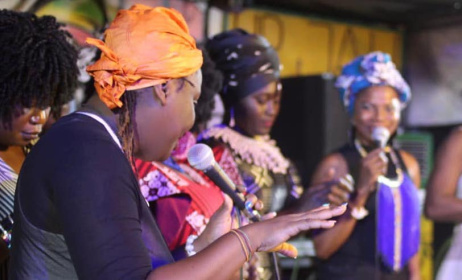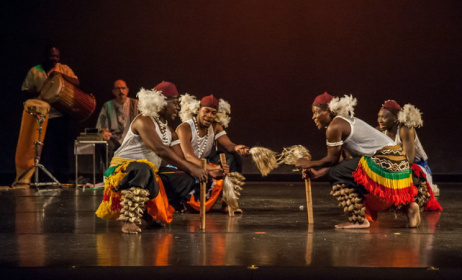Ghana: Peter Somuah drops sophomore album Highlife
Ghanaian trumpeter Peter Somuah has released his sophomore album Highlife, which is available for streaming and download on all major digital platforms.
 Peter Somuah. Photo: Patrick Kenawy
Peter Somuah. Photo: Patrick Kenawy
The 10-track project was heralded by the ‘Chop Chop’ single featuring highlife veteran Gyedu-Blay Ambolley.
According to a press statement, Highlife was recorded in Berlin’s Neukölln borough using vintage analogue equipment to bring listeners directly in touch with the kind of earthy sound typical of the historic highlife recordings of the 50s and 60s. According to the musician, he “wanted to bring this very special sound back to life. Its warmth, its grit, its exuberant joy.”
Somuah then flew to Ghana with the instrumental tracks and visited highlife heroes such as Pat Thomas and Gyedu Blay-Ambolley. “During my childhood, I used to hear their songs on the radio all the time,” he said. “Back then, I would never have dreamed that I would one day be sitting in their living rooms to record them for my album.”
The album begins with a history lesson. For ‘The Rhythm’, Peter Somuah visited highlife legend Koo-Nimo in Kumasi and encouraged the veteran to talk about the origins of the music.
Somuah is now taking the journey and the al chemical progress of ‘highlife’ further as he leads the music to completely new shores more than half a century after its golden age. ‘In the meantime, the original high life had lost it’s popularity, especially with a new generation,” says Somuah. “Many of the young people no longer know it.’ President Kwame Nkrumah had declared highlife the national dance after Ghana’s independence, and bands like that of ET Mensah, the ‘King of Highlife’, toured throughout Africa. But in the 1980s, a military coup destroyed Accra’s vibrant music scene. The months-long evening curfew led to the closure of all clubs. Most of the musicians went into exile. “From here, the music took on completely new influences,” explains Somuah. “Rock, funk and, above all, disco influences were incorporated, studio-produced tracks and keyboards replaced the big orchestras’. Among the Ghanaian exile community in Hamburg arose a new style, which was known as ‘burger high life.”
Somuah himself became involved with this popular highlife style as part of various bands, before following his passion for jazz. The spark came from Miles Davis whom Somuah discovered through a friend. He fell in love with the language of the African-American jazz revolutionary straight away: “I jammed in Accra’s only jazz club, imitating Miles and later also Freddie Hubbard – but at the same time tried to bring my own style into it.’ The way Somuah brought jazz awakening and tradition together was unheard of. The move to Rotterdam opened many doors for him and his Dutch quintet worldwide. On the other hand, the distance from his home soil now gives Somuah a new perspective on highlife.
It’s not only the sounds but also the narrative tradition of this music that interests Somuah: “Typically, it deals with everyday stories, it tells of love, friendship and family, combined with a certain morality,” the bandleader himself also sings on ‘Mental Slavery” – following in the footsteps of Fela Kuti, another of Somuah’s long-standing idols and sources of ideas. “I’m talking about the enduring legacy of the colonial era: many Ghanaians are still mentally enslaved, see them selves as inferior. They don’t dare to proudly present them selves and to contribute their skills.”
Somuah’s Highlife album seems like an antidote to this – a powerful combination of musical freedom and taking the courage to stand up for yourself. For the trumpeter, the two belong together: dancing to the rhythms of his grandparents, while at the same time looking to and being part of the future of jazz.




























Commentaires
s'identifier or register to post comments